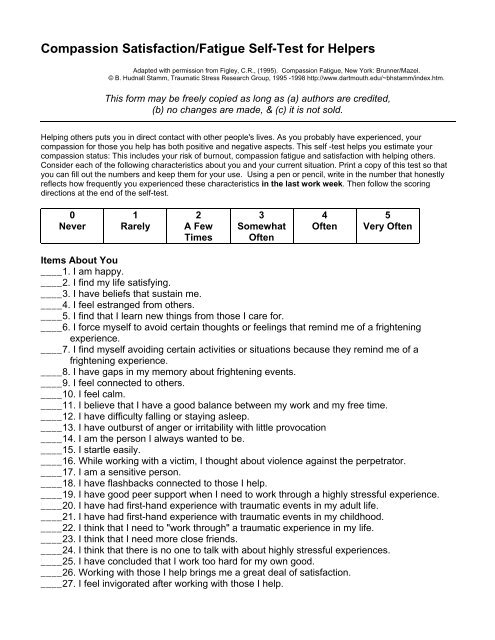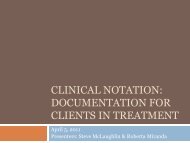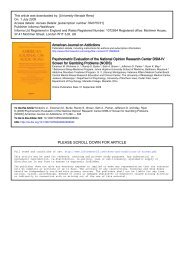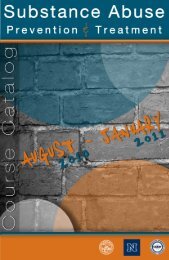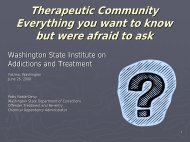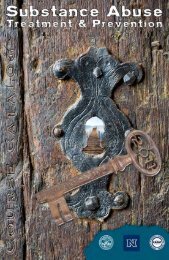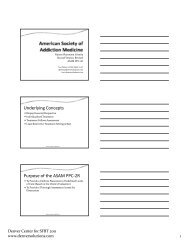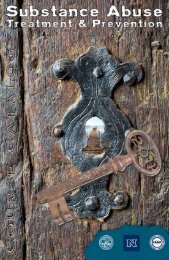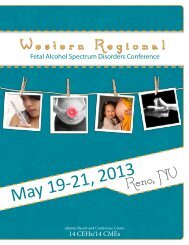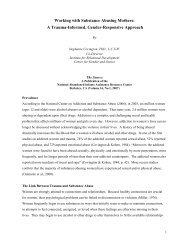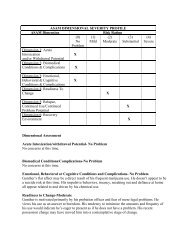Compassion Satisfaction/Fatigue Self-Test for Helpers - CASAT
Compassion Satisfaction/Fatigue Self-Test for Helpers - CASAT
Compassion Satisfaction/Fatigue Self-Test for Helpers - CASAT
You also want an ePaper? Increase the reach of your titles
YUMPU automatically turns print PDFs into web optimized ePapers that Google loves.
<strong>Compassion</strong> <strong>Satisfaction</strong>/<strong>Fatigue</strong> <strong>Self</strong>-<strong>Test</strong> <strong>for</strong> <strong>Helpers</strong><br />
Adapted with permission from Figley, C.R., (1995). <strong>Compassion</strong> <strong>Fatigue</strong>, New York: Brunner/Mazel.<br />
© B. Hudnall Stamm, Traumatic Stress Research Group, 1995 -1998 http://www.dartmouth.edu/~bhstamm/index.htm.<br />
This <strong>for</strong>m may be freely copied as long as (a) authors are credited,<br />
(b) no changes are made, & (c) it is not sold.<br />
Helping others puts you in direct contact with other people's lives. As you probably have experienced, your<br />
compassion <strong>for</strong> those you help has both positive and negative aspects. This self -test helps you estimate your<br />
compassion status: This includes your risk of burnout, compassion fatigue and satisfaction with helping others.<br />
Consider each of the following characteristics about you and your current situation. Print a copy of this test so that<br />
you can fill out the numbers and keep them <strong>for</strong> your use. Using a pen or pencil, write in the number that honestly<br />
reflects how frequently you experienced these characteristics in the last work week. Then follow the scoring<br />
directions at the end of the self-test.<br />
0<br />
Never<br />
1<br />
Rarely<br />
2<br />
A Few<br />
Times<br />
3<br />
Somewhat<br />
Often<br />
4<br />
Often<br />
5<br />
Very Often<br />
Items About You<br />
____1. I am happy.<br />
____2. I find my life satisfying.<br />
____3. I have beliefs that sustain me.<br />
____4. I feel estranged from others.<br />
____5. I find that I learn new things from those I care <strong>for</strong>.<br />
____6. I <strong>for</strong>ce myself to avoid certain thoughts or feelings that remind me of a frightening<br />
experience.<br />
____7. I find myself avoiding certain activities or situations because they remind me of a<br />
frightening experience.<br />
____8. I have gaps in my memory about frightening events.<br />
____9. I feel connected to others.<br />
____10. I feel calm.<br />
____11. I believe that I have a good balance between my work and my free time.<br />
____12. I have difficulty falling or staying asleep.<br />
____13. I have outburst of anger or irritability with little provocation<br />
____14. I am the person I always wanted to be.<br />
____15. I startle easily.<br />
____16. While working with a victim, I thought about violence against the perpetrator.<br />
____17. I am a sensitive person.<br />
____18. I have flashbacks connected to those I help.<br />
____19. I have good peer support when I need to work through a highly stressful experience.<br />
____20. I have had first-hand experience with traumatic events in my adult life.<br />
____21. I have had first-hand experience with traumatic events in my childhood.<br />
____22. I think that I need to "work through" a traumatic experience in my life.<br />
____23. I think that I need more close friends.<br />
____24. I think that there is no one to talk with about highly stressful experiences.<br />
____25. I have concluded that I work too hard <strong>for</strong> my own good.<br />
____26. Working with those I help brings me a great deal of satisfaction.<br />
____27. I feel invigorated after working with those I help.
0<br />
Never<br />
<strong>Compassion</strong> <strong>Satisfaction</strong>/<strong>Fatigue</strong> <strong>Self</strong>-<strong>Test</strong> <strong>for</strong> <strong>Helpers</strong> - CONTINUED<br />
1<br />
4<br />
5<br />
Rarely<br />
Often Very Often<br />
2<br />
A Few<br />
Times<br />
3<br />
Somewhat<br />
Often<br />
____28. I am frightened of things a person I helped has said or done to me.<br />
____29. I experience troubling dreams similar to those I help.<br />
____30. I have happy thoughts about those I help and how I could help them.<br />
____31. I experienced intrusive thoughts of times with especially difficult people I helped.<br />
____32. I have suddenly and involuntarily recalled a frightening experience while working with a<br />
person I helped.<br />
____33. I am preoccupied with more than one person I help.<br />
____34. I am losing sleep over a person I help's traumatic experiences.<br />
____35. I have joyful feelings about how I can help the victims I work with.<br />
____36. I think that I might have been "infected" by the traumatic stress of those I help.<br />
____37. I think that I might be positively "inoculated" by the traumatic stress of those I help.<br />
____38. I remind myself to be less concerned about the well being of those I help.<br />
____39. I have felt trapped by my work as a helper.<br />
____40. I have a sense of hopelessness associated with working with those I help.<br />
____41. I have felt "on edge" about various things and I attribute this to working with certain<br />
people I help.<br />
____42. I wish that I could avoid working with some people I help.<br />
____43. Some people I help are particularly enjoyable to work with.<br />
____44. I have been in danger working with people I help.<br />
____45. I feel that some people I help dislike me personally.<br />
Items About Being a Helper and Your Helping Environment<br />
____46. I like my work as a helper.<br />
____47. I feel like I have the tools and resources that I need to do my work as a helper.<br />
____48. I have felt weak, tired, run down as a result of my work as helper.<br />
____49. I have felt depressed as a result of my work as a helper.<br />
____50. I have thoughts that I am a "success" as a helper.<br />
____51. I am unsuccessful at separating helping from personal life.<br />
____52. I enjoy my co-workers.<br />
____53. I depend on my co-workers to help me when I need it.<br />
____54. My co-workers can depend on me <strong>for</strong> help when they need it.<br />
____55. I trust my co-workers.<br />
____56. I feel little compassion toward most of my co-workers<br />
____57. I am pleased with how I am able to keep up with helping technology.<br />
____58. I feel I am working more <strong>for</strong> the money/prestige than <strong>for</strong> personal fulfillment.<br />
____59. Although I have to do paperwork that I don't like, I still have time to work with those<br />
help.<br />
____60. I find it difficult separating my personal life from my helper life.<br />
____61. I am pleased with how I am able to keep up with helping techniques and protocols.<br />
____62. I have a sense of worthlessness/disillusionment/resentment associated with my role as<br />
a helper.<br />
____63. I have thoughts that I am a "failure" as a helper.<br />
____64. I have thoughts that I am not succeeding at achieving my life goals.<br />
____65. I have to deal with bureaucratic, unimportant tasks in my work as a helper.<br />
____66. I plan to be a helper <strong>for</strong> a long time.
PART I<br />
___yes___no<br />
TRS<br />
T R A U M A R E C O V E R Y S C A L E<br />
I have been exposed to a traumatic event in which both of the following were present:<br />
a. experienced, witnessed or was confronted with an event or events that involved actual<br />
or threatened death or serious injury, or a threat to the physical integrity of self or<br />
others, AND<br />
b. my response involved intense fear, helplessness or horror.<br />
• If yes is answered please complete Part II & III;<br />
• If no is answered complete Part III (omit Part II)<br />
PART II<br />
Directions: Please read the following list and check all that apply.<br />
Type Of Traumatic Event Number of Times Dates/Age(s)<br />
1. Childhood Sexual Abuse _____ _____ _____ _____<br />
2. Rape _____ _____ _____ _____<br />
3. Other Adult Sexual Assault/Abuse _____ _____ _____ _____<br />
4. Natural Disaster _____ _____ _____ _____<br />
5. Industrial Disaster _____ _____ _____ _____<br />
6. Motor Vehicle Accident _____ _____ _____ _____<br />
7 Combat Trauma _____ _____ _____ _____<br />
8. Witnessing Traumatic Event _____ _____ _____ _____<br />
9. Childhood Physical Abuse _____ _____ _____ _____<br />
10. Adult Physical Abuse _____ _____ _____ _____<br />
11. Victim Of Other Violent Crime _____ _____ _____ _____<br />
12. Captivity _____ _____ _____ _____<br />
13. Torture _____ _____ _____ _____<br />
14. Domestic Violence _____ _____ _____ _____<br />
15. Sexual Harassment _____ _____ _____ _____<br />
16. Threat of physical violence _____ _____ _____ _____<br />
17. Accidental physical injury _____ _____ _____ _____<br />
18. Humiliation _____ _____ _____ _____<br />
19. Property Loss _____ _____ _____ _____<br />
20. Death Of Loved One _____ _____ _____ _____<br />
21. Terrorism _____ _____ _____ _____<br />
23. Other:__________________ _____ _____ _____ _____<br />
24. Other:__________________ _____ _____ _____ _____<br />
25. Other:__________________ _____ _____ _____ _____<br />
Comments: _________________________________________________________________________<br />
__________________________________________________________________________________<br />
__________________________________________________________________________________
TRS T R A U M A R E C O V E R Y S C A LE<br />
J. Eric Gentry<br />
PART III<br />
Place a mark on the line that best represents your experiences during the past week.<br />
1. I make it through the day without distressing recollections of past events.<br />
._____._____._____._____._____._____._____._____._____._____.<br />
0% 100% of the time<br />
2. I sleep free from nightmares.<br />
._____._____._____._____._____._____._____._____._____._____.<br />
0% 100% of the time<br />
3. I am able to stay in control when I think of difficult memories.<br />
._____._____._____._____._____._____._____._____._____._____.<br />
0% 100% of the time<br />
4. I do the things that I used to avoid (e.g., daily activities, social activities,<br />
thoughts of events and people connected with past events).<br />
._____._____._____._____._____._____._____._____._____._____.<br />
0% 100% of the time<br />
5. I am safe.<br />
._____._____._____._____._____._____._____._____._____._____.<br />
0% 100% of the time<br />
I feel safe.<br />
._____._____._____._____._____._____._____._____._____._____.<br />
0% 100% of the time<br />
6. I have supportive relationships in my life.<br />
._____._____._____._____._____._____._____._____._____._____.<br />
0% 100% of the time<br />
7. I find that I can now safely feel a full range of emotions.<br />
._____._____._____._____._____._____._____._____._____._____.<br />
0% 100% of the time<br />
8. I can allow things to happen in my surroundings without needing to control them.<br />
._____._____._____._____._____._____._____._____._____._____.<br />
0% 100% of the time<br />
9. I am able to concentrate on thoughts of my choice.<br />
._____._____._____._____._____._____._____._____._____._____.<br />
0% 100% of the time<br />
10. I have a sense of hope about the future.<br />
._____._____._____._____._____._____._____._____._____._____.<br />
0% 100% of the time<br />
AS – FS<br />
Scoring Instructions: record the score <strong>for</strong> where the hash mark<br />
falls on the line (0-100) in the box beside the item (average 5a with<br />
5b to get score <strong>for</strong> 5). Sum scores and divide by 10.<br />
Interpretation: 100 – 95 (full recovery/subclinical); 86 - 94<br />
(significant recovery/mild symptoms); 75 – 85 (some recovery/<br />
moderate symptoms); 74 (minimal recovery/severe); below 35<br />
(possible traumatic regression)<br />
Mean Score
Silencing Response Scale (Baranowsky, 1996, 1998)<br />
INSTRUCTIONS: This scale was developed to help caregivers identify specific communication struggles in their<br />
work. Choose the number that best reflects your experience using the following rating system, where 1 signifies<br />
rarely or never and 10 means very often. Answer all items to the best of your ability as they reflect your feelings<br />
over the previous two work weeks.<br />
1=Rarely/Never --------2----------3--------4---------5--------6--------7--------8--------9------ 10=Always<br />
Sometimes<br />
(1)____<br />
(2)____<br />
(3)____<br />
(4)____<br />
(5)____<br />
(6)____<br />
(7)____<br />
(8)____<br />
(9)____<br />
Are there times when you believe your client(s) is repeating emotional issues you feel were already<br />
covered<br />
Do you get angry with client(s)<br />
Are there times when you react with sarcasm toward your client(s)<br />
Are there times when you fake interest<br />
Do you feel that listening to certain experiences of your client(s) will not help<br />
Do you feel that letting your client talk about their trauma will hurt them<br />
Do you feel that listening to your client's experiences will hurt you<br />
Are there times that you blame your client <strong>for</strong> the bad things that have happened to them<br />
Are there times when you are unable to believe what your client is telling you because what they are<br />
describing seems overly traumatic<br />
(10)____ Are there times when you feel numb, avoidant or apathetic be<strong>for</strong>e meeting with certain clients<br />
(11)____ Do you consistently support certain clients in avoiding important therapeutic material despite ample time<br />
to address their concerns<br />
(12)____ Are there times when sessions do not seem to be going well or the client's treatment progress appears to<br />
be blocked<br />
(13)____ You become negatively aroused when a client is angry with you.<br />
(14)____ Are there times when you cannot remember what a client has just said<br />
(15)____ Are there times when you cannot focus on what a client is saying<br />
TOTAL = ________
GLOBAL CHECK SET (GCS, Baranowsky & Gentry, 1998)<br />
Name:_________________________ Date:_____________ BirthDate:_________ Sex: M F<br />
Instructions: Read through each statement responding to items in a manner that best describes your experience<br />
over the previous 2 work weeks. Some questions relate to the present and some to the past, respond accordingly.<br />
Never Rarely Some Frequently Almost<br />
times<br />
Always<br />
1-a. I drink alcoholic beverages daily. 0 1 2 3 4<br />
2-d. I feel sad, empty or become tearful. 0 1 2 3 4<br />
3-s. I feel hopeless or worthless. 0 1 2 3 4<br />
4-p. I have been exposed directly or indirectly 0 1 2 3 4<br />
(i.e., family, friend) to a traumatic event.<br />
5-x. I worry and feel anxious. 0 1 2 3 4<br />
6-i. My body is usually pain free. 4 3 2 1 0<br />
7-c. I am unable to clearly recall past traumatic experiences. 0 1 2 3 4<br />
8-a. I use illegal drugs daily. 0 1 2 3 4<br />
9-d. My sleep is disrupted or I awake tired. 0 1 2 3 4<br />
10-s. I have a positive and cheerful attitude to life. 4 3 2 1 0<br />
11-p. I have frequent recollections to a traumatic incident.<br />
(i.e., thoughts, dreams, flashbacks).<br />
0 1 2 3 4<br />
12-x. I seem to be unable to control my worries or fears 0 1 2 3 4<br />
13-i. I worry about my health. 0 1 2 3 4<br />
14-c. I do not know how I came to be at some place. 0 1 2 3 4<br />
15-a. Drug or alcohol use interferes with my work ability. 0 1 2 3 4<br />
16-d. I am no longer interested in the activities I used to enjoy. 0 1 2 3 4<br />
17-s. I think about ending my life. 0 1 2 3 4<br />
18-i. I have not been well due to diagnosed physical illness(es). 0 1 2 3 4<br />
19-c. I easily recall important personal in<strong>for</strong>mation about myself. 4 3 2 1 0<br />
20-a. Drugs/alcohol have negatively impacted my personal life. 0 1 2 3 4<br />
21-d. I have a lot of energy. 4 3 2 1 0<br />
22-s. I have a specific plan to end my life. 0 1 2 3 4<br />
23-p. I am quick to anger. 0 1 2 3 4<br />
24-x. I always feel on edge. 0 1 2 3 4<br />
25-i. I have frequent headaches. 0 1 2 3 4<br />
26-c. I act out of character and feel I don’t know myself. 0 1 2 3 4<br />
27-a. Drugs or alcohol are a problem in my life. 0 1 2 3 4<br />
28-d. I have lost or gained more than 10 lbs. recently. 0 1 2 3 4<br />
29-s. I fear that my life will never improve. 0 1 2 3 4<br />
30-p. I avoid people, places or things that are trauma reminders. 0 1 2 3 4<br />
31-x. My concentration is good. 4 3 2 1 0<br />
32-i. I am afraid I will become seriously ill in the future. 0 1 2 3 4<br />
33-c. I feel outside of myself - detached like an observer. 0 1 2 3 4<br />
34-p. I am fairly relaxed and do not startle easily. 4 3 2 1 0<br />
35-x. I feel irritable most of the time. 0 1 2 3 4<br />
_____ + _____ + _____ + _____ + _____ + _____ + _____ = _____<br />
d a s p x i c TOTAL GSC SCORE
Index of Clinical Stress (Abel, 1991)<br />
Name:_________________________________<br />
Date:______________________<br />
This questionnaire is designed to measure the way you feel about the amount of personal stress<br />
that you experience. It is not a test, so there are no right or wrong answers. Answer each item<br />
as carefully and as accurately as you can by placing a number beside each one as follows:<br />
1=None of the time<br />
2=Very little<br />
3=A little of the time<br />
4=Some of the time<br />
5=A good part of the time<br />
6=Most of the time<br />
7=All of the time<br />
1. ____ I feel extremely tense.<br />
2. ____ I feel very jittery.<br />
3. ____ I feel like I want to scream.<br />
4. ____ I feel overwhelmed.<br />
5. ____ I feel very relaxed.<br />
6. ____ I feel so anxious I want to cry.<br />
7. ____ I feel so stressed that I would like to hit something.<br />
8. ____ I feel very calm and peaceful.<br />
9. ____ I feel like I am stretched to the breaking point.<br />
10. ____ It is very hard <strong>for</strong> me to relax.<br />
11. ____ It is very easy <strong>for</strong> me to fall asleep at night.<br />
12. ____ I feel an enormous sense of pressure on me.<br />
13. ____ I feel like my life is going very smoothly.<br />
14. ____ I feel very panicked.<br />
15. ____ I feel like I am on the verge of total collapse.<br />
16. ____ I feel like I am losing control of my life.<br />
17. ____ I feel that I am near the breaking point.<br />
18. ____ I feel wound up like a coiled spring.<br />
19. ____ I feel that I can’t keep up with the demands on me.<br />
20. ____ I feel very much behind in my work.<br />
21. ____ I feel tense and angry with those around me.<br />
22. ____ I feel I must race from one task to the next.<br />
23. ____ I feel that I just can’t keep up with everything.<br />
24. ____ I feel as tight as a drum.<br />
25. ____ I feel very much on edge.<br />
Score: _____
COMPASSION FATIGUE ASSESSMENT PROFILE<br />
1. <strong>Compassion</strong> <strong>Satisfaction</strong>/<strong>Fatigue</strong> <strong>Self</strong> <strong>Test</strong> (Stamm & Figley, 1998, 1995)<br />
Measures<br />
• <strong>Compassion</strong> <strong>Satisfaction</strong><br />
• <strong>Compassion</strong> <strong>Fatigue</strong><br />
• Burnout<br />
Scoring<br />
• Circle the following 23 items: 4, 6-8, 12-13, 15-16, 18, 20-22, 28-29, 31-34, 36, 38-40, 44.<br />
• Put a check by the following 16 items: 17, 23-25, 41-42, 45, 48, 49, 51, 56, 58, 60, 62-65.<br />
• Put an “X” by the following 26 items: 1-3, 5, 9-11, 14, 19, 26-27, 30, 35, 37, 43, 46-47, 50,<br />
52-55, 57, 59, 61, 66.<br />
• (Add the numbers you wrote next to the items <strong>for</strong> each set of items and note: )<br />
• Add all circled numbers <strong>for</strong> your <strong>Compassion</strong> <strong>Fatigue</strong> risk factor: TOTAL = _____<br />
26 or less=extremely low risk; 27-30=low risk; 31-35=moderate risk; 36-40=high risk; 41 or<br />
more=extremely high risk.<br />
• Add all numbers with checks beside them <strong>for</strong> your Burnout risk: TOTAL = _____<br />
36 or less=extremely low risk; 37-50=moderate risk; 51-75=high risk; 76-85=extremely high risk.<br />
• Total numbers marked "X" <strong>for</strong> <strong>Compassion</strong> <strong>Satisfaction</strong> factor: TOTAL= _____<br />
118 and above=extremely high potential; 100-117=high potential; 82-99=good potential; 64-<br />
81=modest potential; below 63-0=low potential.<br />
FURTHER INTERPRETATION (Figley, In Press)<br />
Distinguish between changing jobs & changing ways: Look as your 3 sub-scores and the<br />
various combinations:<br />
Score Burnout Level ComFat* Level ComSat** Level<br />
High High Burnout High CF High <strong>Satisfaction</strong><br />
Medium Mod Burnout Mod CF Mod <strong>Satisfaction</strong><br />
Low Low Burnout Low CF Low <strong>Satisfaction</strong><br />
Change Careers:<br />
Change Jobs:<br />
Stay & Manage Stress:<br />
Change Client:<br />
High Burnout, High CF, Low <strong>Satisfaction</strong><br />
High Burnout, Low CF, High <strong>Satisfaction</strong><br />
Low Burnout, High CF, Mod <strong>Satisfaction</strong><br />
Low Burnout, Low CF, Low <strong>Satisfaction</strong><br />
*ComFat: <strong>Compassion</strong> <strong>Fatigue</strong> Level<br />
** ComSat: <strong>Compassion</strong> <strong>Satisfaction</strong> Level
2. Trauma Recovery Scale (Gentry, 1996, 1998)<br />
Measures<br />
• PART I: Respondent's belief whether or not they meet Criterion A. (DSM-IV) <strong>for</strong> PTSD. This<br />
refers to whether they have been exposed directly or indirectly to a traumatic incident.<br />
• PART II: History of traumatic experiences<br />
• PART III: Relative recovery and stabilization from traumatic experiences.<br />
Scoring<br />
• PARTS I & II do not require scoring.<br />
• PART III: Take the mean of the two answers <strong>for</strong> item #5 and add to the scores on all other<br />
items. Divide by ten and you will arrive at a mean score. If score is < 50 then significant<br />
traumatic stress; If score is > 75 then significant recovery (or minimal traumatic stress).<br />
3. Silencing Response Scale (Baranowsky, 1996, 1998)<br />
Measures<br />
• The silencing response<br />
Scoring<br />
• To score total all response scores to arrive at the sum of scores.<br />
• High risk = 95 - 150; Moderate risk = 41 - 94; Some risk = 21 - 40; Minimal risk = 0 - 20.<br />
4. Global Check Set (Baranowsky & Gentry, 1998)<br />
Measures<br />
• Psychological Disorders - including Depression(d) (# 2, 9, 16, 21, 28), Substance Use(a) (#<br />
1, 8, 15, 20, 27), Suicidality(s) (# 3, 10, 17, 22, 29), PTSD(p) (# 4, 11, 23, 30, 34),<br />
Generalized Anxiety Disorder(x) (# 5, 12, 24, 31, 35), Somatization(i) (# 6, 13, 18, 25,<br />
32), and Dissociation(c) (# 7, 14, 19, 26, 33).<br />
Scoring<br />
• Total sum of scores as listed on scale items (Total GSC Score)<br />
• For greater clarification total sub-scores <strong>for</strong> subscales above (d, a, s, p, x, i, c)<br />
• Higher Scores signify greater psychological distress - compare scores over time<br />
• Scores of > 70 = significant psychological symptomatology<br />
• This scale is not to be used <strong>for</strong> diagnostic purposes.
5. Index of Clinical Stress (Abel, 1991)<br />
Measures<br />
Subjective individual stress<br />
Scoring<br />
• Reverse scores <strong>for</strong> Items 5, 8, 11, 13<br />
• Add Reversed Item scores then add Remaining Item scores to get the Total Score<br />
______ + ______ = ______<br />
(Reversed Items) (Remaing Items) (Total Score)<br />
• Subtract total # completed items (25 on scale) from Total Score to get Item Score<br />
______ - ______ = ______<br />
(Total Score) (#items complete) (Item Score)<br />
• Multiply Item Score by 100 to get Adjusted Score<br />
______ X 100 = ______<br />
(Item Score)<br />
(Adjusted Score)<br />
• Multiply # of completed items (25 on scale) by 6 to get Divisor<br />
______ X __6__ = ______<br />
(#items complete)<br />
(Divisor)<br />
• The Adjusted Total is divided by the Divisor to get the Total ICS Score<br />
______ / ______ = ______<br />
(Adjusted Total) (Divisor) (Total ICS Score)<br />
• Total ICS Score should range between 0-100<br />
Scores > 30 = significant stress
MISSION STATEMENT INSTRUCTIONS (Alternate Short Version)<br />
On your journey toward wellness and recovery from <strong>Compassion</strong> <strong>Fatigue</strong> we invite you to<br />
explore your early memories of being a caring person, how this led you to become a working<br />
caregiver, what that means to you and what keeps you from achieving your ideal in your work.<br />
Please consider the following categories and try to answer them being in general or as specific<br />
as you wish. This is an exploration and there<strong>for</strong>e there can be no right or wrong approach or<br />
answer. Follow your instincts on this one and they will send you in just the right direction.<br />
YOUR PROFESSIONAL DEVELOPMENT<br />
*What is it about you that led you toward helping others<br />
PERSONAL & PROFESSIONAL ETHICS<br />
*What are the values that you will never compromise in your work with clients<br />
COMMITMENTS<br />
*What are you committed to offer clients What are you committed to offer yourself<br />
STRENGTHS: Clients & your own<br />
*What do you believe about your clients What about your own strengths<br />
YOUR IDEAL<br />
*If you were to become your ideal caregiver how would life look to you<br />
ROADBLOCKS AND BAD TRAFFIC<br />
*What impediments keep you from this ideal<br />
These are just some questions designed to stir your thinking on this topic. Give yourself some<br />
time to think about your personal Mission Statement, then take the plunge and commit your<br />
thoughts to paper. However, make sure to offer yourself creative license in this endeavor.<br />
Remember, there is no right or wrong Mission Statement and, chances are, it will be in continual<br />
evolution as long as you practice in this field. This is a wonderful gift to give yourself and can be<br />
a source of empowerment and inspiration <strong>for</strong> you in the future. Enjoy.
PERSONAL MISSION STATEMENT (Alternate Short Version)<br />
USE AS MUCH SPACE AS YOU NEED!<br />
YOUR PROFESSIONAL DEVELOPMENT<br />
*What is it about you that led you toward helping others<br />
PERSONAL & PROFESSIONAL ETHICS<br />
*What are the values that you will never compromise in your work with clients<br />
COMMITMENTS<br />
*What are you committed to offer clients What are you committed to offer yourself<br />
STRENGTHS: Clients & your own<br />
*What do you believe about your clients What about your own strengths<br />
YOUR IDEAL<br />
*If you were to become your ideal caregiver how would life look to you<br />
ROADBLOCKS AND BAD TRAFFIC<br />
*What impediments keep you from this ideal
LETTER FROM<br />
"THE GREAT SUPERVISOR"<br />
This letter should be written to yourself from an omniscient (all knowing) and omni-benevolent<br />
(all good) source. It should reflect the nurturance, support and validation that you have wanted<br />
and needed to hear from someone in authority. It should focus upon your strengths, assets and<br />
goodness. This will be a challenge <strong>for</strong> some ... the more honest and sincere that you make this<br />
letter, the more benefit you will receive from the work that will come with it in subsequent<br />
sessions.<br />
Dear _______________,<br />
________________________________________________________________<br />
________________________________________________________________<br />
________________________________________________________________<br />
________________________________________________________________<br />
________________________________________________________________<br />
________________________________________________________________<br />
________________________________________________________________<br />
________________________________________________________________<br />
________________________________________________________________<br />
________________________________________________________________<br />
________________________________________________________________<br />
________________________________________________________________<br />
________________________________________________________________<br />
________________________________________________________________<br />
________________________________________________________________<br />
________________________________________________________________<br />
________________________________________________________________<br />
________________________________________________________________<br />
________________________________________________________________<br />
________________________________________________________________<br />
________________________________________________________________<br />
________________________________________________________________<br />
________________________________________________________________<br />
________________________________________________________________<br />
________________________________________________________________<br />
________________________________________________________________<br />
_______________________,<br />
_______________________


